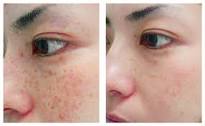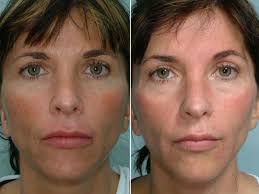Laser Freckles Removal Surgery
A Freckle or Brown spots is a macules, pigmented fleck found on the skin, most frequently the face, chest, forearms, and back of the hands. Freckels are small brown or tan patches common in individuals with lighter skin, blond or red hair, and blue, green or gray eyes. They appear early in life, increase in number during summer months and fade in winter. After the age of 40-45 freckle disappear, but who wants to wait? So, in this section we provide effective freckle removal techniques including Freckle Laser Removal.
Information on Freckle Causes before Freckle Removal Process
Causes of freckles include genetics, diseases (such as xeroderma pigmentosum, a rare disease that causes an increased sensitivity to ultraviolet light, i.e., the sun), and exposure to the sun. The basic cause of freckle is special cells in the skin that produce a pigment called melanin. Melanin is what gives skin its color. Sunlight hitting the skin causes the production of more melanin in order to protect the skin layers underneath. If you have melanin that builds up in one place, it will result in freckles. Sunlight also causes freckles already present to become darker. Dark skin that appears during pregnancy or while on birth control pills is called melasma, or the mask of pregnancy. Sun exposure makes these patches and spots even darker. Flat, large spots on the skin in middle age are caused by sun exposure, and are known as age spots, liver spots, or lentigines. Sun exposure is also powerful enough to change certain skin cells into dangerous skin cancers, leading physicians to recommend protective sunscreen and clothing. These actions can also help slow the appearance of both freckles and age spots. For those who already have any brown, discolored lesions, an in-depth consultation should be scheduled with a physician. He or she will perform a careful examination to determine that these spots are not pre-cancerous. This can develop on the skin causing growths that have irregular borders and strange colors such as black, red or pink. Look for spots that don't heal, have lack of symmetry, or are of a large size. See a dermatologist if you have any spots (freckle) on your skin that look suspicious.
Freckle Laser Removal Technique
Freckle removal is easily achieved with lasers. Before lasers, it was difficult to remove freckles because the lesions are so small. But with laser, the treatment can be pinpointed at even a very small spot. Other methods used to remove freckles include laser resurfacing, Retin-A, and chemical peels. Laser resurfacing is a pretty significant procedure to recover from, so it is usually done only when there is severe sun damage or undesired wrinkles to remove as well. Retin-A is a good treatment, but good results take several to many months of use of the product. Chemical peels are of two main types, superficial, and deeper. The superficial peels, such as glycolic peels, are able to remove freckles, but usually with many repeated treatments. The deeper peels will get rid of freckles all at once, but recovery is more significant.











Information on Freckle Causes before Freckle Removal Process
Causes of freckles include genetics, diseases (such as xeroderma pigmentosum, a rare disease that causes an increased sensitivity to ultraviolet light, i.e., the sun), and exposure to the sun. The basic cause of freckle is special cells in the skin that produce a pigment called melanin. Melanin is what gives skin its color. Sunlight hitting the skin causes the production of more melanin in order to protect the skin layers underneath. If you have melanin that builds up in one place, it will result in freckles. Sunlight also causes freckles already present to become darker. Dark skin that appears during pregnancy or while on birth control pills is called melasma, or the mask of pregnancy. Sun exposure makes these patches and spots even darker. Flat, large spots on the skin in middle age are caused by sun exposure, and are known as age spots, liver spots, or lentigines. Sun exposure is also powerful enough to change certain skin cells into dangerous skin cancers, leading physicians to recommend protective sunscreen and clothing. These actions can also help slow the appearance of both freckles and age spots. For those who already have any brown, discolored lesions, an in-depth consultation should be scheduled with a physician. He or she will perform a careful examination to determine that these spots are not pre-cancerous. This can develop on the skin causing growths that have irregular borders and strange colors such as black, red or pink. Look for spots that don't heal, have lack of symmetry, or are of a large size. See a dermatologist if you have any spots (freckle) on your skin that look suspicious.
Freckle Laser Removal Technique
Freckle removal is easily achieved with lasers. Before lasers, it was difficult to remove freckles because the lesions are so small. But with laser, the treatment can be pinpointed at even a very small spot. Other methods used to remove freckles include laser resurfacing, Retin-A, and chemical peels. Laser resurfacing is a pretty significant procedure to recover from, so it is usually done only when there is severe sun damage or undesired wrinkles to remove as well. Retin-A is a good treatment, but good results take several to many months of use of the product. Chemical peels are of two main types, superficial, and deeper. The superficial peels, such as glycolic peels, are able to remove freckles, but usually with many repeated treatments. The deeper peels will get rid of freckles all at once, but recovery is more significant.
More information and facts on freckle laser removal
What do I get rid of Freckle?
Freckels are small brown or tan patches common in individuals with lighter skin, blond or red hair, and blue, green or gray eyes.
Efforts to get rid of freckles go back centuries. Ancient Egyptians used oil of fenugreek to fade freckles and age spots. In more modern cultures, lemon juice was a favorite home remedy. All of that gave way to modern cosmetics and bleaching agents, none of which have been overly effective.
More advanced techniques to get rid of freckle include freezing, chemical peels, dermabrasion and laser resurfacing may get rid of freckles and age spots, but such treatments can be painful, and they may damage healthy skin or cause scarring. Conventional treatments for freckles include cosmetic cover-ups and bleaching creams, neither of which have garnered satisfactory results. Heavy cosmetics need frequent touchups, and are not a good fit for today's active lifestyles. Bleaching agents attempt to fade the freckles to a color approximating that of the surrounding skin. However, they can sometimes lighten or darken the skin surrounding the freckles, calling even more attention to the spots. Occasionally, bleaching agents cause rashes or chemical burns.
What do I get rid of Freckle?
Freckels are small brown or tan patches common in individuals with lighter skin, blond or red hair, and blue, green or gray eyes.
Efforts to get rid of freckles go back centuries. Ancient Egyptians used oil of fenugreek to fade freckles and age spots. In more modern cultures, lemon juice was a favorite home remedy. All of that gave way to modern cosmetics and bleaching agents, none of which have been overly effective.
More advanced techniques to get rid of freckle include freezing, chemical peels, dermabrasion and laser resurfacing may get rid of freckles and age spots, but such treatments can be painful, and they may damage healthy skin or cause scarring. Conventional treatments for freckles include cosmetic cover-ups and bleaching creams, neither of which have garnered satisfactory results. Heavy cosmetics need frequent touchups, and are not a good fit for today's active lifestyles. Bleaching agents attempt to fade the freckles to a color approximating that of the surrounding skin. However, they can sometimes lighten or darken the skin surrounding the freckles, calling even more attention to the spots. Occasionally, bleaching agents cause rashes or chemical burns.
Treatment to get rid of freckle and freckle removal
Some people have had success using alpha hydroxy acids on a regular basis, combined with sun avoidance and the use of sun block. Some dermatologists recommend prescription-strength retinoids for the treatment of freckles. More modern treatments for lightening freckles include freezing them with liquid nitrogen, and the use of strong acid peels or ablative laser treatments which are also used to treat fine lines and wrinkles. Freezing, chemical peels and ablative laser treatments, while more effective than conventional treatments, can damage healthy skin, cause scarring and demand lengthy recovery times. Most prescription creams used to lighten the skin contain hydroquinone. Bleaches lighten and fade darkened skin patches by slowing the production of melanin so those dark spots gradually fade to match normal skin coloration. Prescription bleaches contain twice the amount of hydroquinone, the active ingredient, as over-the-counter skin bleaches. In more severe cases prescription creams with tretinoin and a cortisone cream are added. These are somewhat irritating to sensitive skin and will take 3-6 months to produce improvement.
Some people have had success using alpha hydroxy acids on a regular basis, combined with sun avoidance and the use of sun block. Some dermatologists recommend prescription-strength retinoids for the treatment of freckles. More modern treatments for lightening freckles include freezing them with liquid nitrogen, and the use of strong acid peels or ablative laser treatments which are also used to treat fine lines and wrinkles. Freezing, chemical peels and ablative laser treatments, while more effective than conventional treatments, can damage healthy skin, cause scarring and demand lengthy recovery times. Most prescription creams used to lighten the skin contain hydroquinone. Bleaches lighten and fade darkened skin patches by slowing the production of melanin so those dark spots gradually fade to match normal skin coloration. Prescription bleaches contain twice the amount of hydroquinone, the active ingredient, as over-the-counter skin bleaches. In more severe cases prescription creams with tretinoin and a cortisone cream are added. These are somewhat irritating to sensitive skin and will take 3-6 months to produce improvement.






0 comments:
Post a Comment